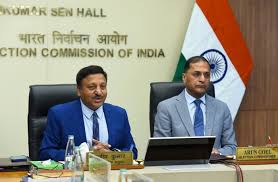Reforming the Chief Election Commissioner Appointment Process
Current Affairs NationalPosted by newadmin on 2025-02-19 09:03:04 |
Share: Facebook | Twitter | Whatsapp | Linkedin Visits: 110

A high-level meeting recently took place involving Prime Minister Narendra Modi, Home Minister Amit Shah, and Leader of Opposition Rahul Gandhi to appoint a successor to Chief Election Commissioner Rajiv Kumar, who was set to retire. This meeting highlighted significant changes in the appointment process for the Chief Election Commissioner (CEC) and raised concerns regarding the new law governing these appointments.
Historically, the Chief Election Commissioner and Election Commissioners were appointed by the President of India based on the Prime Minister’s advice, without formal legislation regulating the process. The most senior Election Commissioner typically succeeded the outgoing CEC, with seniority determined by the date of appointment. However, in cases where commissioners were appointed on the same day, ambiguity sometimes arose.
The appointment process has now changed with the enactment of the Chief Election Commissioner and Other Election Commissioners (Appointment, Conditions of Service and Term of Office) Act, 2023. This law establishes a more structured procedure for selecting the CEC and Election Commissioners, creating a search committee led by the Law Minister to shortlist candidates. These shortlisted names are then reviewed by a selection committee comprising the Prime Minister, the Leader of Opposition, and a Cabinet Minister.
Unlike the previous system, the selection committee can consider candidates beyond the initial shortlist, allowing for a broader pool of nominees. The new Act also outlines specific eligibility criteria, requiring candidates to have held a position equivalent to a Secretary in the Government of India and to possess integrity and experience in managing elections. Officials serving as the CEC or Election Commissioners are not eligible for reappointment, and their maximum term is capped at six years.
The revised appointment process was largely influenced by Supreme Court interventions, as the Court had noted that the Constitution did not intend for the Executive to have exclusive authority over such appointments. This led to the establishment of a more inclusive selection mechanism through the new law passed by Parliament.
Despite these changes, legal challenges persist. The Association for Democratic Reforms has contested the exclusion of the Chief Justice of India from the selection committee, arguing that it undermines the independence of the Election Commission. The Supreme Court is set to hear these petitions, raising questions about Parliament’s authority to override judicial rulings through legislative action.
Search
Categories
Recent News
- Hyderabad's Traffic Wings Get a Boost with IPS Officer Reshuffle
- Uncovering the Golden Scheme: I-T Raids Expose Bullion Trading Secrets
- Big Tech's Child Safety Crisis: Australia Sounds the Alarm
- Blue Cloud Softech's $150M Edge AI Chip Venture
- Nuclear Diplomacy Revived: US and Iran Resume Talks
- Curiosity Illuminates Mars: Unveiling the Red Planet's Night Secrets
- Telangana's Cybercrime Conclave: AI Takes Centre Stage
- SEIL's Rs 20 Crore Hospital Project: A Milestone for Rural Healthcare
Popular News
- Navigating IPO Market Dynamics Amid Volatility and Regulatory Changes
- Massive Worldwide Microsoft Outage Disrupts Multiple Sectors
- Panjapur Bus Stand to Reshape TNSTC Routes
- తెలుగుదేశం పార్టీ - పేదరికాన్ని నిర్మూలించడంలో వాగ్దానం
- Universities Embrace Remote Learning Technologies Amidst Ongoing Pandemic